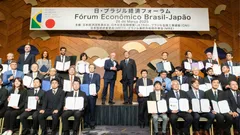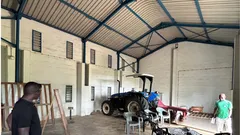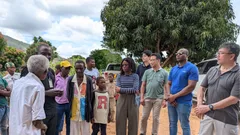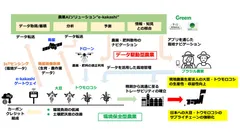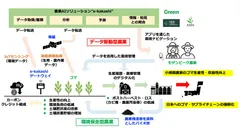Double adoption by the Ministry of Economy, Trade and Industry (METI) for the Global South Future-oriented Co-creation Project (Survey on the Promotion of Overseas Development of Infrastructure by Japanese Companies)
We are aiming to strengthen Japan's food resource supply chain by implementing a small-scale verification project in Brazil to improve productivity and establish traceability for soybeans and corn. Additionally, we are conducting an FS project in Mozambique focused on the pro-environment production of sesame and the digitalization of its value chain.
Greein Inc.
Greein Inc. (Headquartered in Minato-ku, Tokyo; CEO Takashi Togami; hereinafter "Greein"), which provides AI-based agricultural solutions “e-kakashi” both domestically and internationally, has had its proposed projects, the " Pilot Project for Enhancing the Resilience of the Soybean and Corn Supply Chain in Brazil " and the " Feasibility Study on the Sustainable Digitalization of the Oilseed Value Chain in Mozambique," selected for “the Global South Future-oriented Co-creation Project (Survey on the Promotion of Overseas Development of Infrastructure by Japanese Companies)" implemented by the Ministry of Economy, Trade and Industry of Japan (METI).
In Brazil, we will examine the technical effectiveness and business viability of a business model for cultivation and quality control using IoT sensing and satellite image analysis technologies to improve sustainable soybean and corn productivity and establish traceability throughout the supply chain in the state of Rio Grande do Sul.
Meanwhile, in Mozambique, in the province of Nampula, located in the Nacala Corridor region in the north, we will examine the technical effectiveness and business feasibility of a pro-environment friendly sesame production model and value chain digitization that combines IoT sensing and satellite image analysis technologies with biochar.
The implementation period for both projects is scheduled to begin in June of this year and last for 9 months until the end of February 2026.
Background of the Proposal and Project Overview
1) Brazil (target crops: soybeans, corn)
Japan depends on imports for almost all of its soybeans and corn, with a high level of dependence on the United States, the major supplier, making it necessary to diversify supply risks. Brazil, the project country, is the largest producer and exporter of soybeans in the world, and the second-largest producer of corn after the United States. However, in recent years, environmental challenges such as droughts, floods caused by abnormal weather, and deforestation due to the expansion of agricultural land have been exacerbated, along with soil degradation and increased use of pesticides, which have placed a significant burden on the environment.
In this context, this project aims to improve productivity and profitability in soybean and corn production in Brazil by introducing pro-environment smart agriculture technologies, including IoT sensing and satellite image analysis. Specifically, cultivation algorithms will be used to predict the optimal harvest timing, pest and disease outbreaks, and to optimize irrigation management. This will not only enhance productivity and profitability but also reduce environmental impact through pesticide reduction, water conservation, and soil conservation. Furthermore, by establishing traceability throughout the production and distribution processes, the project aims to strengthen the soybean and corn supply chain to Japan.
This project will be carried out by forming a consortium with the International Center for Tropical Agriculture (CIAT, headquartered in Colombia), with which Greein has previous collaboration experience, and local startup Crops Team Serviços de Consultoria, Pesquisa e Desenvolvimento LTDA, among others.
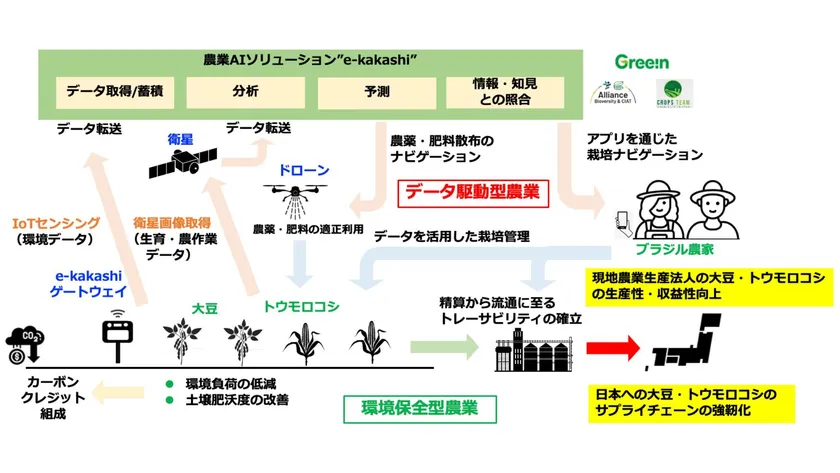
Image of a sustainable soybean and corn production model in Brazil
2) Mozambique (Target crop: sesame)
Japan's annual sesame consumption is approximately 180,000 tons as of 2022, with 99.9% of it relying on imports. Mozambique, the project country, is the fourth-largest sesame exporter to Japan, following Nigeria, Burkina Faso, and Tanzania, accounting for 8.6% of Japan's total sesame imports. However, reliance on traditional farming methods, which are highly susceptible to climate change, has hindered improvements in yield and quality. Additionally, issues related to food safety, such as aflatoxin contamination and pesticide residues during the post-harvest process, pose barriers to entry into export markets.
In this context, this project aims to improve productivity and profitability in sesame production in Mozambique by introducing pro-environment smart agriculture technologies, including IoT sensing and satellite image analysis combined with biochar. Specifically, cultivation algorithms will be used to predict the optimal harvest timing and pest outbreaks, while biochar will be employed to improve soil fertility. The project will aim to both increase productivity and profitability, while also reducing environmental impact through pesticide reduction and soil conservation. Furthermore, by promoting the digitalization of sesame production history and warehouse management by smallholder farmers, the project seeks to reduce post-harvest losses and strengthen the sesame supply chain to Japan.
This project will be implemented by forming a consortium with Nippon Biodiesel Fuel Co., Ltd. (NBF), which has been operating in northern Mozambique for many years, and its local subsidiary, Agro-Negócios para o Desenvolvimento de Moçambique, Limitada (ADM), a company focused on developing agro-business in Mozambique.
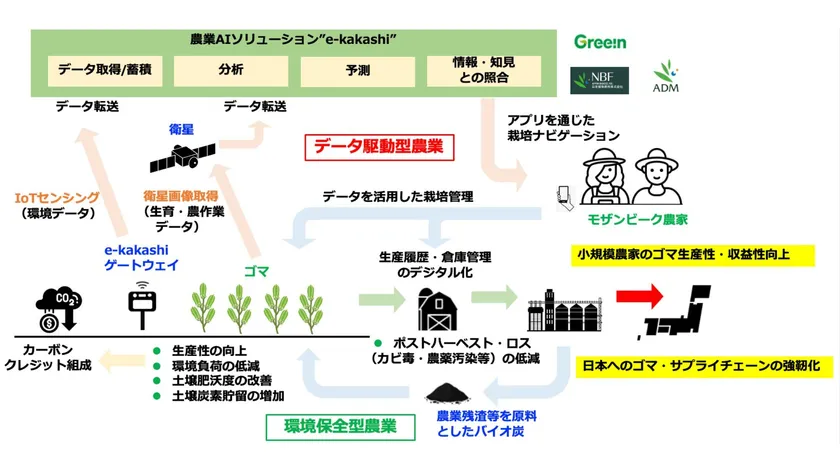
Image of pro-environment sesame value chain digitization in Mozambique
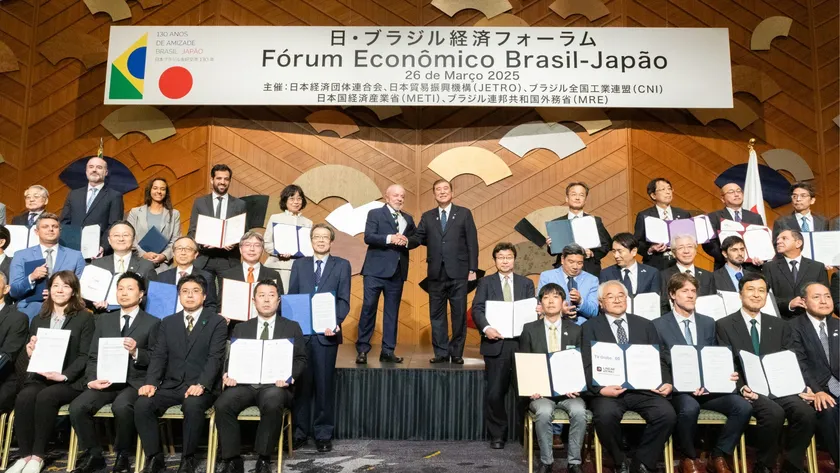
Announcement of the consortium memorandum at the Japan-Brazil Business Forum with the attendance of the leaders of Japan and Brazil
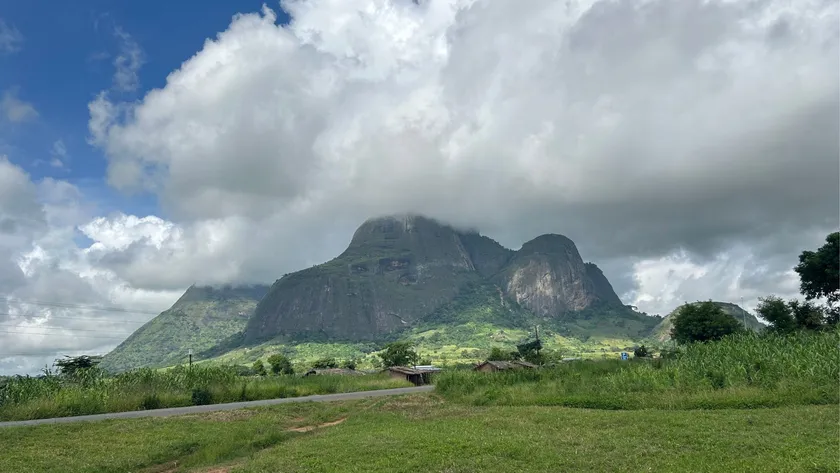
Sesame production site in Nampula Province, Northern Mozambique
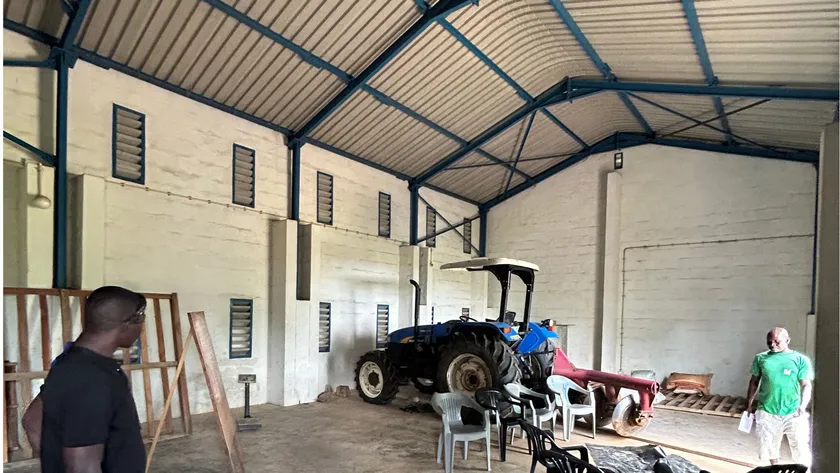
Grain storage warehouses in the potential target community of Nampula Province
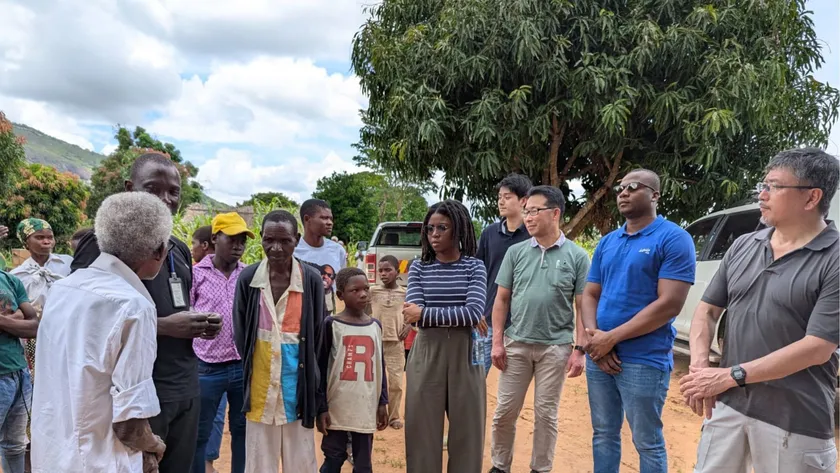
Farmer interviews in the potential target community of Nampula Province ( CPO Hanai, on the leftmost side)
Company Information
Company Name: Greein Inc.
Representative: Takashi Togami, CEO
Address: Taiyo Seimei Shinagawa Building 28F, 2-16-2 Konan, Minato-ku, Tokyo, Japan
Establishment: April 18, 2024
Business Description: Providing agricultural AI brain "e-kakashi", Offering advanced analysis services combining sensor data and growth history
Capital: 100 million yen
- Category:
- Corporate Trends
